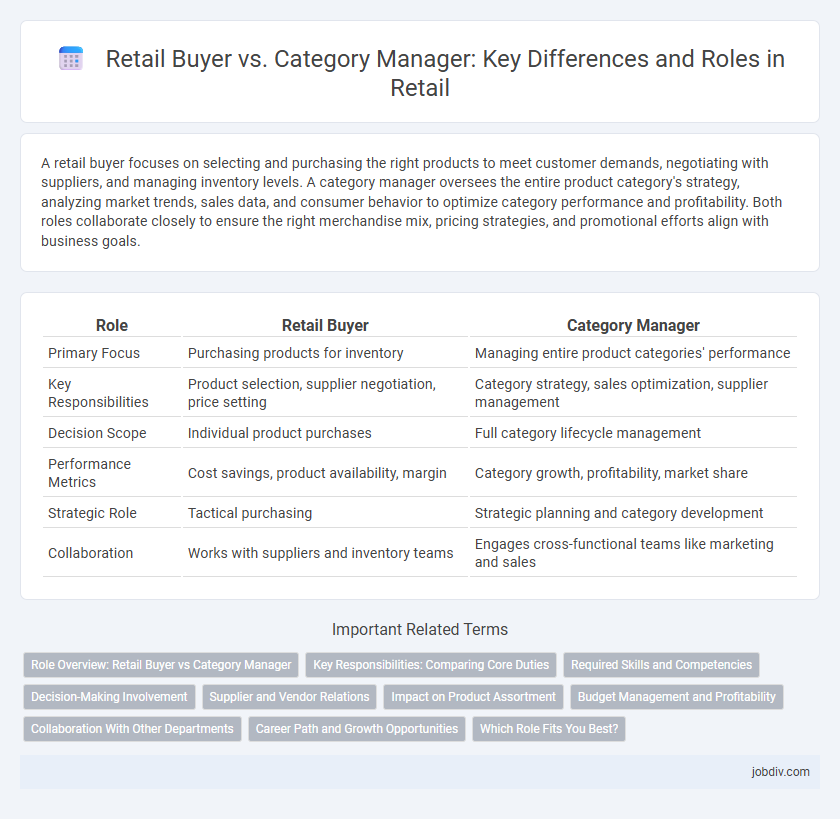A retail buyer focuses on selecting and purchasing the right products to meet customer demands, negotiating with suppliers, and managing inventory levels. A category manager oversees the entire product category's strategy, analyzing market trends, sales data, and consumer behavior to optimize category performance and profitability. Both roles collaborate closely to ensure the right merchandise mix, pricing strategies, and promotional efforts align with business goals.
Table of Comparison
| Role | Retail Buyer | Category Manager |
|---|---|---|
| Primary Focus | Purchasing products for inventory | Managing entire product categories' performance |
| Key Responsibilities | Product selection, supplier negotiation, price setting | Category strategy, sales optimization, supplier management |
| Decision Scope | Individual product purchases | Full category lifecycle management |
| Performance Metrics | Cost savings, product availability, margin | Category growth, profitability, market share |
| Strategic Role | Tactical purchasing | Strategic planning and category development |
| Collaboration | Works with suppliers and inventory teams | Engages cross-functional teams like marketing and sales |
Role Overview: Retail Buyer vs Category Manager
A Retail Buyer focuses on selecting and purchasing products based on market trends, consumer demand, and supplier negotiations to optimize inventory and sales. A Category Manager oversees the performance of an entire product category, analyzing sales data, optimizing product assortment, and developing pricing strategies to maximize category profitability. Both roles require collaboration with suppliers and internal teams, but the Category Manager has a broader strategic responsibility compared to the product-focused approach of the Retail Buyer.
Key Responsibilities: Comparing Core Duties
A Retail Buyer primarily focuses on selecting and purchasing products that align with customer demand and store strategy, leveraging supplier negotiations and market trends to optimize assortment and pricing. In contrast, a Category Manager oversees the broader category strategy, including product lifecycle management, promotional planning, and performance analysis to maximize category profitability and market share. Both roles require strong analytical skills, but the Category Manager integrates cross-functional collaboration to drive long-term category growth beyond immediate purchasing decisions.
Required Skills and Competencies
Retail Buyers must excel in negotiation, market analysis, and supplier relationship management to secure profitable product assortments and optimize inventory levels. Category Managers require strong analytical skills, strategic planning, and cross-functional collaboration abilities to develop category growth plans and drive sales performance. Both roles demand proficiency in data-driven decision-making and deep market trend insights to align product strategies with consumer demand.
Decision-Making Involvement
Retail buyers primarily focus on selecting products and negotiating with suppliers to optimize inventory and pricing strategies, impacting short-term sales performance. Category managers engage in broader strategic decision-making, analyzing market trends, consumer behavior, and category performance to drive long-term profitability and growth. The decision-making involvement of category managers spans cross-functional collaboration, including marketing, supply chain, and finance teams, whereas retail buyers operate more directly with vendor management and procurement processes.
Supplier and Vendor Relations
Retail Buyers primarily focus on sourcing products and negotiating terms directly with suppliers to ensure optimal pricing and availability. Category Managers oversee a broader strategic approach, managing supplier and vendor relations to optimize product assortment, pricing strategies, and promotional activities within specific categories. Effective collaboration between Retail Buyers and Category Managers enhances vendor partnerships and drives category growth through targeted supplier engagement.
Impact on Product Assortment
Retail Buyers primarily focus on selecting and purchasing products that meet consumer demand while optimizing inventory turnover rates, directly influencing the breadth and depth of the product assortment. Category Managers analyze market trends, sales data, and consumer behavior to strategically curate and manage product categories, enhancing assortment effectiveness and profitability. Together, these roles ensure a balanced product assortment that aligns with business goals, customer preferences, and competitive positioning.
Budget Management and Profitability
Retail buyers primarily focus on selecting products that align with budget constraints while maximizing profitability through cost-effective purchasing strategies. Category managers oversee broader budget management by analyzing category performance, setting financial targets, and optimizing assortments to enhance overall category profitability. Effective collaboration between retail buyers and category managers ensures balanced budget allocation and sustained profit growth across product lines.
Collaboration With Other Departments
Retail buyers collaborate closely with marketing, finance, and supply chain teams to select products aligned with consumer demand and budget constraints. Category managers coordinate with merchandising, sales, and inventory departments to optimize product assortment and pricing strategies across specific categories. Effective interdepartmental collaboration enhances product availability, drives sales growth, and improves overall customer satisfaction.
Career Path and Growth Opportunities
Retail Buyers focus on selecting and purchasing products based on market trends and supplier negotiations, providing a specialized entry point into retail procurement with opportunities to advance into senior buyer or sourcing roles. Category Managers oversee multiple product categories, using data analytics and strategic planning to optimize sales and profitability, often progressing into leadership positions such as merchandising director or commercial manager. Career growth in retail buying typically emphasizes expertise in supplier relationships and inventory management, while category management offers broader strategic responsibilities and cross-functional team leadership.
Which Role Fits You Best?
A Retail Buyer focuses on selecting and purchasing products to meet customer demand, responsible for negotiating with suppliers and managing inventory levels. A Category Manager oversees the overall strategy for a specific product category, analyzing market trends, sales data, and customer preferences to maximize category profitability. If you excel in relationship-building and tactical purchasing, the Retail Buyer role suits you best, while strategic thinking and data analysis align more with a Category Manager position.
Retail Buyer vs Category Manager Infographic

 jobdiv.com
jobdiv.com